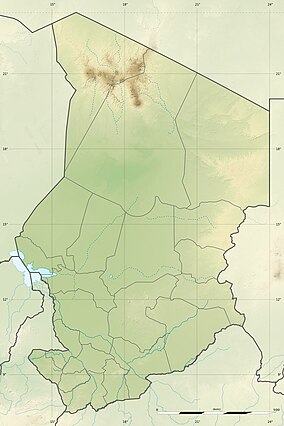Ouadi Rimé-Ouadi Achim Faunal Reserve
| Ouadi-Rimé Ouadi-Hachim Faunal Reserve | |
|---|---|
IUCN category IV (habitat/species management area) | |
 Map of Chad | |
| Location | Chad |
| Nearest city | , Chad |
| Coordinates | 15°31′00″N 19°40′00″E / 15.5166°N 19.6666°ECoordinates: 15°31′00″N 19°40′00″E / 15.5166°N 19.6666°E[1] |
| Area | 77,950 km2 (30,100 sq mi) |
| Established | 1969 |
The Ouadi-Rimé Ouadi-Hachim Faunal Reserve, is located in the administrative region/province in the center of Chad. It an IUCN Category IV area, which was established in 1969. At 77,950 square kilometres (30,100 sq mi) –equivalent to the size of Scotland– it is one of the largest reserves in the world.[2][1][3]
Geography[]
The Ouadi Rimé–Ouadi Achim, covering three habitats of Sahelian wooded grassland, sub-desert grassland (covers about 66% of the area), and desert, and is one of the largest reserves in Chad.[1] Its terrain with an elevation range of 180–250 metres (590–820 ft) has no prominent features except for an isolated patch of a remnant of volcanic eruption. It has a long called the that runs through the reserve in a north–south direction. The eastern part of the reserve has massifs which rise to a height of 1,500 metres (4,900 ft) which drain a number of streams that flow through the reserve. The reserve also flood plains which are inundated temporarily and along with the streams help in creation of the biodiversity of the reserve. Rainfall in the reserve mostly during July–September varies widely with the Sahelian wooded grassland recording a mean annual rainfall in the range of 105–980 millimetres (4.1–38.6 in), the sub-desert grassland zone recording rainfall in the range of 43–570 millimetres (1.7–22.4 in) and the desert with scanty rainfall in the range of 0–73 millimetres (0.0–2.9 in).[1]
Flora[]
Acacia senegal, Balanites aegyptiaca, Combretum glutinosum and Boscia senegalensis are the plant types in the Sahelian grassland. Plant species , and Cenchrus biflorus, herbs , and are recorded in the desert zone; the dune depressions have Acacia tortilis. Also noted are clumps of Cornulaca monacantha in the deserts.[1]
Fauna[]
Faunal species noted are dama gazelle (Gazella dama, CR), Dorcas gazelle (Gazella dorcas, VU), red-fronted gazelle (Gazella rufifrons, VU), Sudan cheetah (Acinonyx jubatus soemmeringii, VU) and addax (Addax nasomaculatus, CR) but the presence of the last two species is now in doubt. The scimitar oryx had its last stronghold in this reserve before eventually going extinct in the wild.[2] Subsequently, a reintroduction program for the species selected Ouadi Rimé-Ouadi Achim to reintroduce it in the wild; as a result, since 2016 a small herd is living within the reserve limits.[2]
Avi fauna reported includes 267 bird species and also three species of the Sudan–Guinea Savanna biome. During the rainy season migrant Palearctic waterbirds flock to the streams in large numbers.[1]
Conservation[]
Though created primarily to protect the fauna in the reserve there are hardly any personnel posted for the purpose. The problem of water shortage due to reduced incidence of rainfall deep tube wells has provided the needed water sources. However, hunting is widely prevalent. Falcon hunters from Persian Gulf who visit the reserve for hunting of bustards and gazelles have been prevented from operating in the reserve under local pressure.[1]
References[]
- ^ a b c d e f g "Chad" (pdf). Birdlife International Organization. Retrieved 19 October 2013.
- ^ a b c "Scimitar-horned oryx returns to Sahara". Zoological Society of London (ZSL). 14 February 2017. Retrieved 28 February 2017.
- ^ "Ouadi Rimé-Ouadi Achim Faunal Reserve". Protectedplanet.net. Retrieved 18 October 2013.
- IUCN Category IV
- Faunal reserves
- Protected areas of Chad
